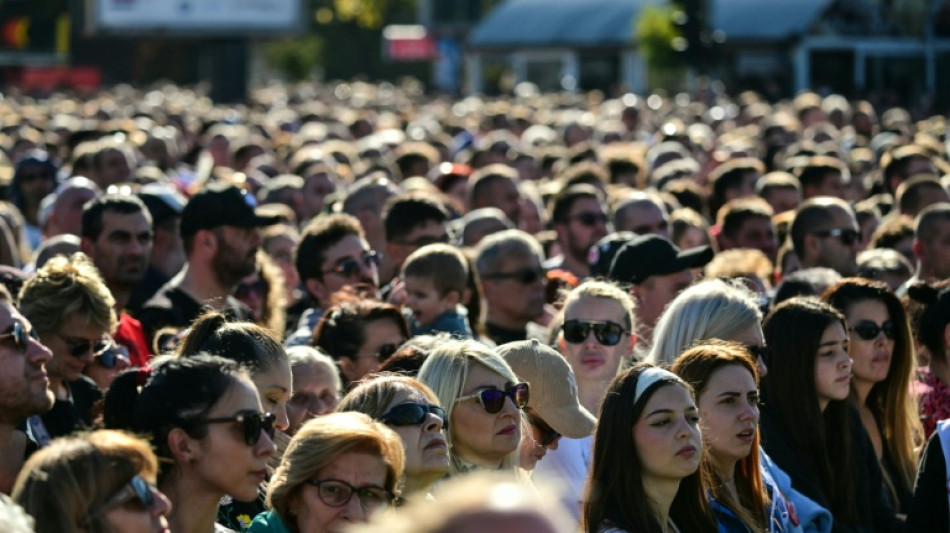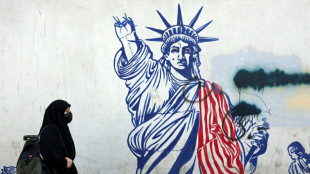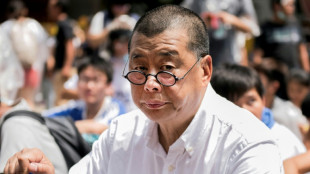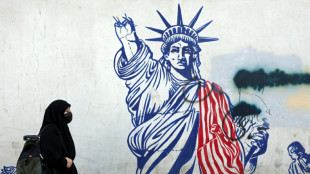
Tens of thousands of Serbians mark first anniversary of deadly train station collapse

Tens of thousands of Serbians on Saturday marked the first anniversary of a deadly railway station roof collapse in Novi Sad, observing 16 minutes of silence for the 16 victims in the country's second-largest city.
At 11:52 am (1052 GMT), the time when the tragedy occurred on November 1, 2024, the crowd of tens of thousands stood in silence in downtown Novi Sad at the start of the commemoration rally, according to AFP journalists.
Crowds filled the roads under bright sunny skies, with many people in tears.
Students, war veterans and victims' families stood alongside people holding wreaths in front of the station, where people had earlier placed candles and flowers.
The mother of one of the victims wailed as she arrived at the site and many people nearby embraced and wept.
Dijana Hrka laid flowers under her son Stefan's name on a fence in front of the station. He was 27 when he died.
"Great pain and great sadness," said Tomislav Savic summarising the feeling of mourners.
"A year has passed, no one is held accountable, no one is prosecuted, nothing is happening," the 50-year-old man from Backa Topola told AFP.
- 'Strongest force - Our youth' -
Since the tragedy, which became a symbol of entrenched corruption, Serbia has been gripped by regular student-led protests.
Protesters first demanded a transparent investigation, but their calls soon escalated into demands for early elections.
Students, who called for the "largest commemorative gathering" on Saturday, and others, have been pouring into Novi Sad since Friday, arriving by car, bicycle, or on foot.
Thousands marched from Belgrade for some 100 kilometres (62 miles), or even from Novi Pazar, around 340 kilometres south of the capital. It took them a symbolic 16 days -- for the 16 victims -- to finish the march.
Late Friday, residents of Novi Sad took to the streets to greet the marchers, blowing whistles and waving flags, many visibly moved.
"I came to bow to the strongest force in the world right now -- our students, our youth," said Ratko Popovic, 47, from the Novi Sad region.
The protests have led to the resignation of the prime minister, the collapse of his government and formation of a new one. But nationalist President Aleksandar Vucic has remained defiantly in office.
Vucic regularly labelled demonstrators as foreign-funded coup plotters, while members of his SNS party push conspiracy theories claiming that the train station roof collapse may have been an orchestrated attack.
But in a televised public address on Friday, Vucic made a rare gesture and apologised for saying things that, he said, he now regretted.
"This applies both to students and to protesters, as well as to others with whom I disagreed. I apologise for that", Vucic said and called for a dialogue.
- 'Tragedy changing Serbia' -
The government has declared Saturday a day of national mourning while head of the Serbian Orthodox Church (SPC) Patriarch Porfirije served a mass for the victims at the Belgrade Saint Sava church.
It was attended by by several hundred people, including government ministers and Vucic. Several thousand others have gathered in front of the church and lit candles for the victims.
EU's enlargement commissioner Marta Kos posted on X that the "tragedy is changing Serbia".
"It moved masses to stand for accountability, free expression and inclusive democracy. They are the same values to lead Serbia into the EU."
On Friday, the EU delegation here appealed to everyone "to act with restraint, to deescalate tensions and to avoid violence".
In September, 13 people, including former construction minister Goran Vesic were charged in a criminal case over the collapse.
A separate anti-corruption probe continues alongside an EU-backed investigation into the possible misuse of EU funds in the project.
oz-al-mp-ljv/ach
A.Riccobono--INP

 London
London

 Manchester
Manchester
 Glasgow
Glasgow
 Dublin
Dublin
 Belfast
Belfast
 Washington
Washington
 Denver
Denver
 Atlanta
Atlanta
 Dallas
Dallas
 Houston Texas
Houston Texas
 New Orleans
New Orleans
 El Paso
El Paso
 Phoenix
Phoenix
 Los Angeles
Los Angeles



